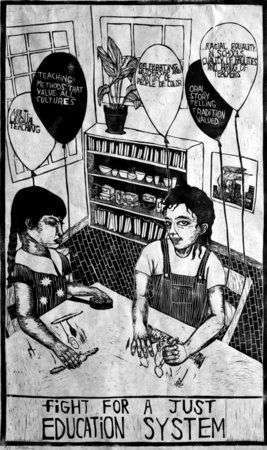Blowin’ in the Wind
Illustrator: Meredith Stern (justseeds.org)

There’s a story behind the cover of this 25th anniversary issue. No doubt, those are cute kids in this painting by renowned artist David Lenz. But Lenz had a larger purpose in mind with his painting Wishes in the Wind. In an interview, Lenz explained that the African American girl spent three months in a homeless shelter with her mother, the Latina girl lives in an inner-city neighborhood, and the white boy lost his father and brother to a drunk driver. The foundation that runs the Wisconsin governor’s mansion commissioned the painting.
“The homeless, central city children, and victims of drunk drivers normally do not have a voice in politics,” Lenz told the Milwaukee Journal Sentinel. “This painting was an opportunity for future governors to look these three children in the eye and, I hope, contemplate how their public policies might affect them and other children like them.”
Evidently, Wisconsin’s notorious Gov. Scott Walker had no interest in looking these children in the eye. He ordered the painting removed. Walker may have hoped that his ditching of Lenz’s painting would pass without notice. Instead the governor’s action offers a stark metaphor for our time: As conservatives and self-styled reformers slash support for schools and social services, and attack teachers and other public workers, they do not intend to calculate the human cost of these actions—particularly the cost to children.
In contrast, 25 years ago a small group of teachers, teacher educators, and education activists launched Rethinking Schools to breathe life into the promise of public schools as places that serve all children. We sought to critique the misuse of standardized testing, the disrespect for students’ intelligence and creativity by mandated curricula, the lack of democracy in school governance, and the growing influence of corporations in determining the content and the very mission of public schools.
The lead article in our inaugural issue was written by one of the Rethinking Schools’ founders, Rita Tenorio. “Confessions of a Kindergarten Teacher: How I Survived Scott Foresman” criticized the corporate-produced basal reading program being adopted by Milwaukee school authorities: “Administrators in MPS (Milwaukee Public Schools) and across the country are responding to pressure to improve our schools by pushing these flawed mechanistic [basal] reading programs even more! Thus they are extending the questionable basal reading program downward to kindergarten.”
Rethinking Schools sought to provoke questioning and dissent, and to nurture models of social justice teaching. We sought to “story” how teachers could teach academic skills as they helped children question inequality and imagine alternatives. And talk about humble beginnings: That first issue of the journal was laid out with rubber cement.
Fast-forward 25 years. Rethinking Schools’ mission has remained remarkably consistent (although, thankfully, we no longer rely on rubber cement to produce the magazine.) Our mission is the same, but our society is not. Diane Ravitch, education historian and fierce critic of today’s manifold attacks on public schools, offers some insight on this new social context:
In the past, we have had pendulum swings about pedagogical methods or educational philosophy, but never a full-fledged, well-funded effort to replace public schools with private management and never a full-throated effort to hold public school teachers accountable for the ills of society.
What is happening now has no precedent. . . . For the first time in our history, there is a concerted attempt, led by powerful people, to undermine the very idea of public schooling and to de-professionalize those who work in this sector.
Thus, we turn 25 at a moment when the future of public schooling is in doubt. Today we can see what’s at the root of the social ills that include the erosion of the commitment to public education—perhaps more clearly than we did 25 years ago. When we published Rethinking Globalization: Teaching for Justice in an Unjust World in 2002, we included an article by former Haitian president Jean-Bertrand Aristide, in which he described the impact of neoliberalism on poor countries and lamented:
Behind the crisis of dollars there is a human crisis: among the poor, immeasurable human suffering; among the others, the powerful, the policymakers, a poverty of spirit, which has made a religion of the market and its invisible hand. A crisis of imagination so profound that the only measure of value is profit, the only measure of human progress is economic growth.
In the past few years, the strategy of deregulation, privatization, and decimation of the public sector that has wreaked havoc around the world has become the dominant strategy in the United States as well. The imperatives of our economic system privilege profit over every other consideration—including children’s welfare, worker dignity, and ecological sustainability.
When we launched Rethinking Schools, President Ronald Reagan was in the midst of waging dirty wars in Central America, notably supporting the contras in Nicaragua. Today’s wars—initiated with similar contempt for the truth as those of the 1980s—have sapped trillions of dollars from our nation and propped up military spending at the expense of all else. The budget shortfalls in all of our states and the resulting cuts on public services are directly tied to the militarism that Martin Luther King Jr. warned us about in his prophetic 1967 speech denouncing the war in Vietnam.
From our founding a quarter century ago, we have editorialized that to rethink schools requires us to rethink the larger society. The importance of this radical questioning of our society and economy is essential for anyone concerned about decent schools—but we have also argued that it is the responsibility of educators to help students raise these same questions and to find the civic courage to act on their answers. In other words, we should act as though we live in a democracy.
For defenders of public education, that civic courage must enact the realization that our schools can only be saved if they are simultaneously transformed. Teachers must ensure that our unions and professional organizations stand on the side of children and parents—that we embrace an expansive democratic practice that engages community members as vital allies and addresses the deep inequities beyond the schoolhouse door that imperil the well-being of our students.
We’ve been in this struggle for a long time. There are rays of hope, but we also feel a sense of urgency. As education activists, we have to ensure that our unions and professional organizations stand on the side of children and our communities. It’s not enough to narrowly defend teacher rights without understanding that the future of public schools and the future of the teaching profession are directly linked to broader social conditions and to the politics of democratic participation. These days, all issues are “union issues.”
As we enter the second quarter century of Rethinking Schools, we’re amazed that we are still here and fighting, and proud of our contributions to a community of teachers, parents, students, and education activists committed to social justice and education as a transformative and radicalizing experience. We look forward to working together in the next 25 years to build a movement strong enough to make our dreams a reality.

